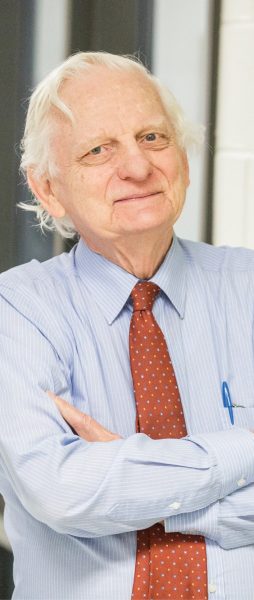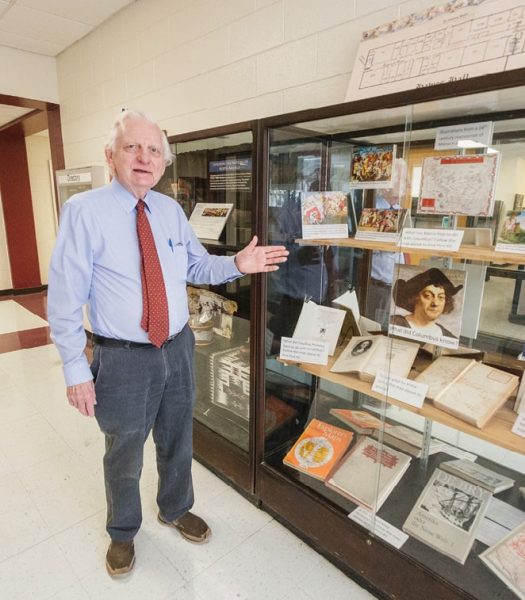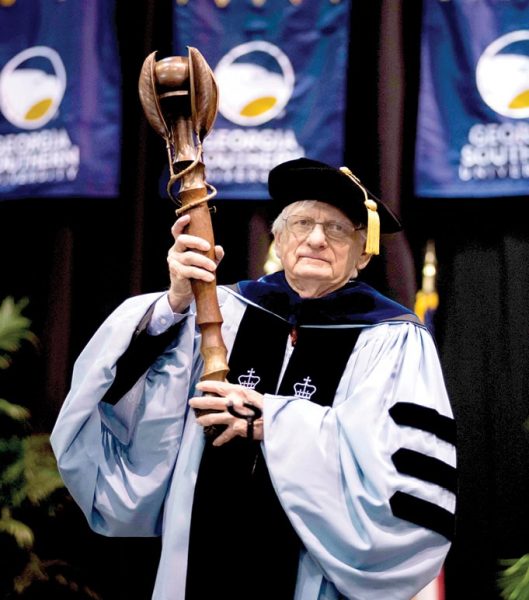From Refugee to Expert
Longest-serving Professor Olavi Arens Says Teaching Keeps Him Going

If you have attended any of the Georgia Southern Commencement ceremonies in the past few years, you might have seen the distinguished white-haired gentleman carrying the mace at the head of the procession. The Mace Bearer is the honor bestowed on the longest-serving professor.
But did you know that Georgia Southern’s Mace Bearer is also the expert you may have seen discussing the war in Ukraine on TV?
History professor Olavi Arens, Ph.D., was born in the Baltic country of Estonia and is frequently called upon by the media for his insights on Russia and the war in Ukraine.
FLEEING ESTONIA
Arens has firsthand experience of the impact of the former Soviet Union’s and present day Russia’s empirical agenda.
“My mother and my two brothers and I were political refugees from Estonia, part of the flight of people out of Eastern Europe due to the Soviet Union’s expansion of communism,” said Arens. “After the Second World War it was tumultuous. We were in refugee camps and settlements in Germany. In 1949 we came to the United States as beneficiaries of President Truman’s refugee act.“
Arens’ family settled in Massachusetts. His mother worked tirelessly to keep the family together and made sure the boys focused on their schoolwork.
“When we came here my mother had to work very hard in order to maintain us,” said Arens. “It was a struggle for her. But she made certain that my two brothers and I were expected to excel in school.”
Arens graduated from high school in Massachusetts and then went on to Harvard.
“After Harvard, I moved to New York City,” recalled Arens. “It was overwhelming to be at Columbia in bustling New York after quiet Harvard.”
For his master’s degree Arens matriculated through the Russian Institute at Columbia University and continued at Columbia for his Ph.D.
During the writing of his dissertation on the revolutionary developments in Estonia of 1917-18, Arens spent a year in Helsinki, Finland, conducting research and frequently visited St. Petersburg, Russia (called Leningrad at the time) for further study.
Later, he taught at Montclair State College in New Jersey and a private high school in New York.
WHERE TO GO NEXT?
In 1974, Arens was looking for a new opportunity.
“I attended the American Historical Association Conference in New Orleans and met the department chair at Armstrong who invited me to Savannah,” said Arens with a chuckle. “I assume the interview went well because they offered me the job.“
At the time, colleagues wondered why Arens would be attracted to a sleepy Southern town. But as a historian, he appreciated the history of Savannah and enjoys the historic preservation that is now so evident. In fact, he lives in a historic Savannah home.

THINKING DIFFERENTLY
Forty eight years after arriving in Savannah and teaching first at Armstrong State and then the consolidated Georgia Southern, Arens still tries to impress on students the need to think in new ways.
“I worked with Olavi last summer to create a mapping project he uses for teaching,” said T. Kurt Knoerl Ph.D., a Georgia Southern assistant professor of history. “I was intrigued by how, after decades of teaching, he was still looking for new ways to get students engaged with learning. He has students explore an exhibit he created to learn about what Christopher Columbus actually knew about the earth and what was in his mind when he began his explorations.“
The student accolades for Arens are many.
“I was able to study abroad in Estonia with him thanks to his single-handed efforts to secure me a scholarship,” said Autumn Johnson (‘09), assistant professor and special collections librarian at Georgia Southern’s Henderson Library. “Dr. Arens is simply the type of professor that really made you want to try harder, read more, think more.”
Arens mentored history student Lee Hitt (‘20) on her honors thesis.
“He had more than a few late nights with me, helping me whip my thesis into shape,” said Hitt. “Any student who has the privilege of taking one of his classes or working with him directly should not pass up the opportunity.”
“Dr. Arens is my mentor,” said Matthew Adams, Ph.D., (‘05), associate professor of history at Savannah State University. “He has helped me more academically than anyone. The man is a gem. I was very fortunate in 2003 to be directed to his office filled with mountains of papers and books where he was hidden. I found my decades-long academic mentor by way of his wispy white hair sticking up among the stacks of papers where he was reading a book.”
It’s obvious that Arens loves teaching as much as his students enjoy studying with him.
“I mean, this is what keeps me going, teaching,” said Arens.
THE WAR IN UKRAINE IS PERSONAL
Because Arens is from Estonia, he constantly watches what is going on with the war. He thinks it will be hard to predict what will happen with President Putin in charge.
“For him, Ukraine was simply part of this Russian empire. So he has to try to show the Russian population and the rest of the world that Russia matters,” said Arens.
But Arens sees hope in the way much of the world has responded to the war.
“I’m generally heartened by the policies pursued presently by the United States and the European leaders of sticking together and presenting a common front.”
THE WAR HAS PIQUED STUDENT INTEREST
“I am scheduled to teach my modern Russia history course in the fall for the first time in a few years”, said Arens. “And I always make it available to older people in the Savannah community. They can attend class free of charge if they are over 62. And of course, we as teachers enjoy the classes where we are able to get diverse student conversations going. If you’ve got a good mix of students it is
very stimulating.”

FUTURE PLANS
Retiring from teaching seems like a distant thought to Arens. When asked about any future retirement plans, he talks instead about the needs of students.
“It’s more important than ever today that students need to understand where people from another culture are coming from. And when I read my final exams, and if I find students understand that, then I’ve done my job. I so enjoy teaching and as long as students find that I am saying useful things and prodding them, then no. I will not retire.”
It looks like Arens will be the Mace Bearer for some years to come.
— Liz Walker
